Project Controlling: Change Management, Risk, Conflict & Personality
VerifiedAdded on 2024/05/31
|19
|4264
|134
Report
AI Summary
This report provides a comprehensive overview of project controlling, focusing on change management, risk management, conflict resolution, and personality analysis within project teams. It begins by outlining the essential stages of project management—initiating, planning, executing, monitoring and controlling, and closing—and then delves into the critical aspects of managing changes across various project management knowledge areas, including integration, scope, time, cost, quality, human resources, and communications. For each knowledge area, the report identifies potential types of changes, their timeframe, corrective actions, and impact on deliverables. Furthermore, the document emphasizes the importance of a robust risk management plan and communication plan to mitigate potential issues. It also addresses conflict management strategies, potential risks, and the significance of understanding team members' personality profiles in relation to project success. The analysis draws comparisons to Wideman's perspectives on project management, highlighting key considerations for effective project control.
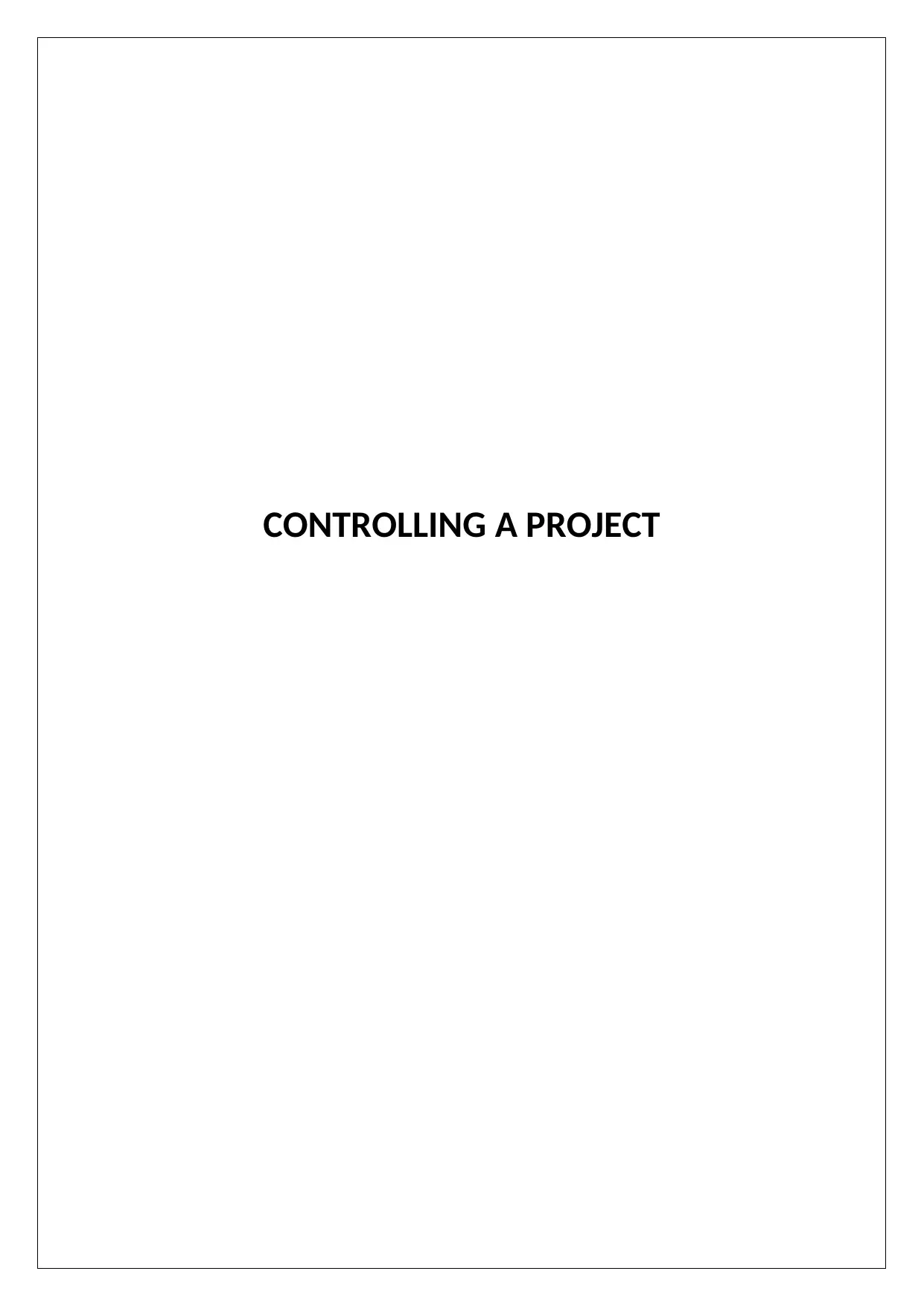
CONTROLLING A PROJECT
Paraphrase This Document
Need a fresh take? Get an instant paraphrase of this document with our AI Paraphraser
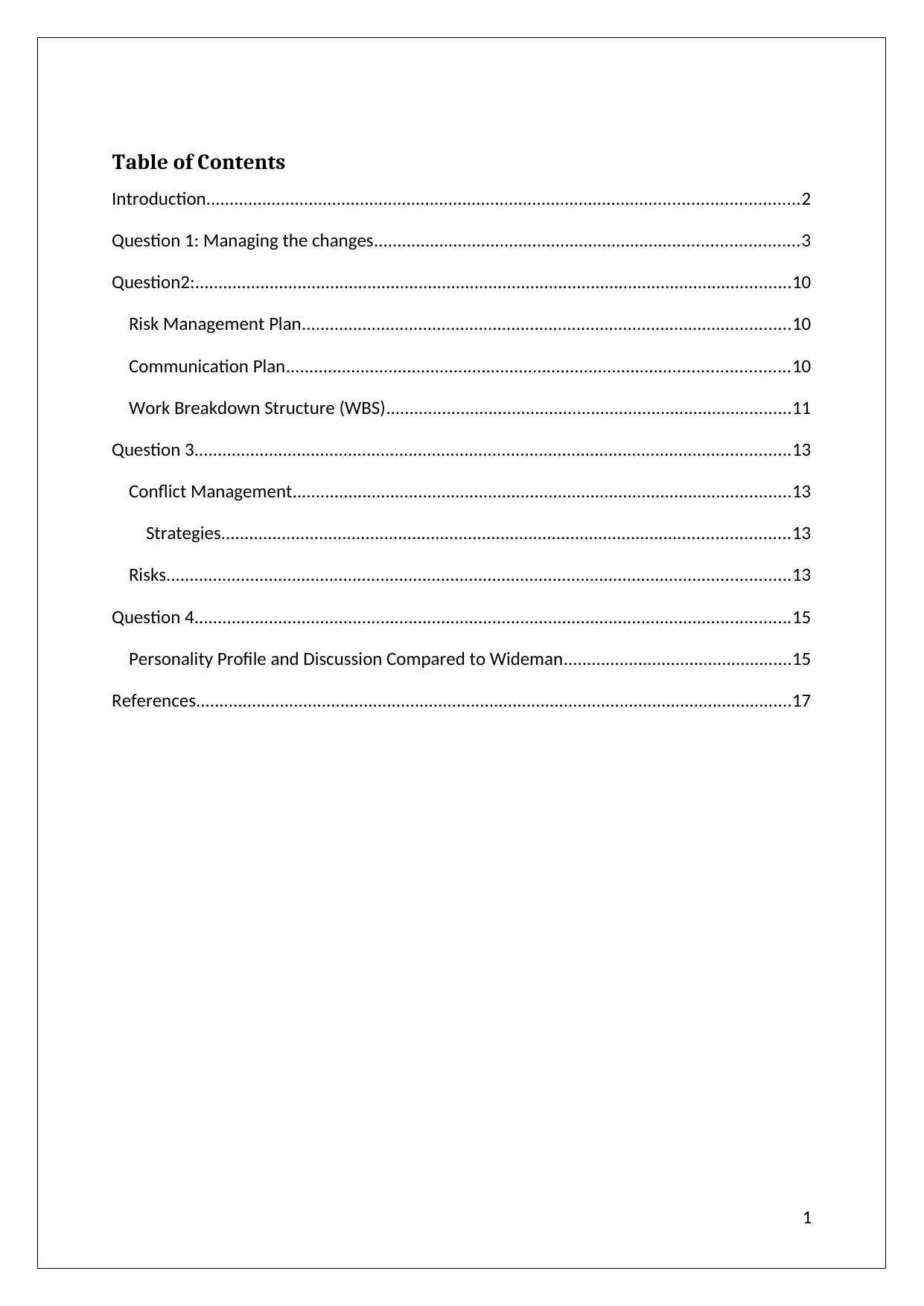
Table of Contents
Introduction...............................................................................................................................2
Question 1: Managing the changes...........................................................................................3
Question2:................................................................................................................................10
Risk Management Plan.........................................................................................................10
Communication Plan............................................................................................................10
Work Breakdown Structure (WBS).......................................................................................11
Question 3................................................................................................................................13
Conflict Management...........................................................................................................13
Strategies..........................................................................................................................13
Risks......................................................................................................................................13
Question 4................................................................................................................................15
Personality Profile and Discussion Compared to Wideman.................................................15
References................................................................................................................................17
1
Introduction...............................................................................................................................2
Question 1: Managing the changes...........................................................................................3
Question2:................................................................................................................................10
Risk Management Plan.........................................................................................................10
Communication Plan............................................................................................................10
Work Breakdown Structure (WBS).......................................................................................11
Question 3................................................................................................................................13
Conflict Management...........................................................................................................13
Strategies..........................................................................................................................13
Risks......................................................................................................................................13
Question 4................................................................................................................................15
Personality Profile and Discussion Compared to Wideman.................................................15
References................................................................................................................................17
1
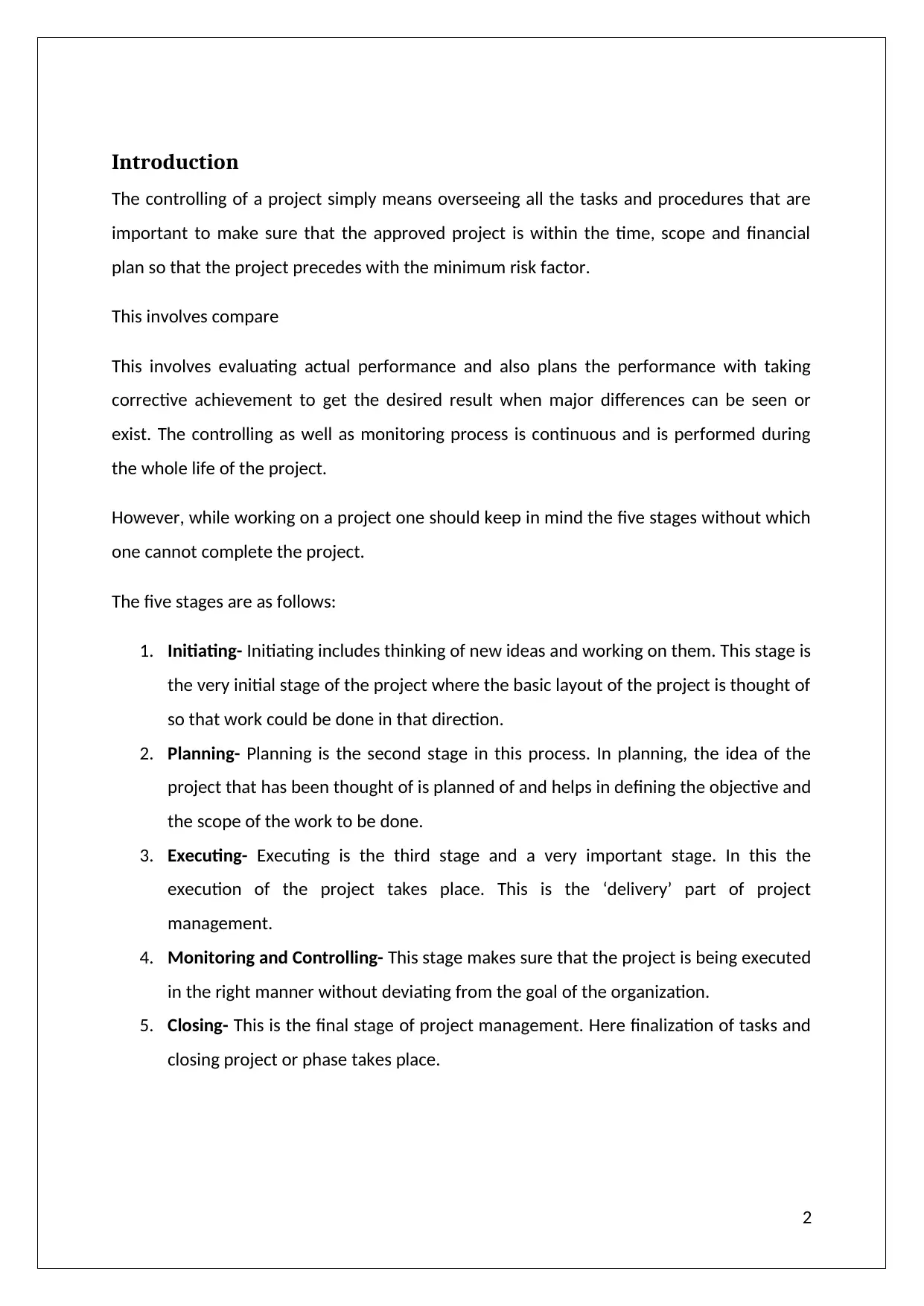
Introduction
The controlling of a project simply means overseeing all the tasks and procedures that are
important to make sure that the approved project is within the time, scope and financial
plan so that the project precedes with the minimum risk factor.
This involves compare
This involves evaluating actual performance and also plans the performance with taking
corrective achievement to get the desired result when major differences can be seen or
exist. The controlling as well as monitoring process is continuous and is performed during
the whole life of the project.
However, while working on a project one should keep in mind the five stages without which
one cannot complete the project.
The five stages are as follows:
1. Initiating- Initiating includes thinking of new ideas and working on them. This stage is
the very initial stage of the project where the basic layout of the project is thought of
so that work could be done in that direction.
2. Planning- Planning is the second stage in this process. In planning, the idea of the
project that has been thought of is planned of and helps in defining the objective and
the scope of the work to be done.
3. Executing- Executing is the third stage and a very important stage. In this the
execution of the project takes place. This is the ‘delivery’ part of project
management.
4. Monitoring and Controlling- This stage makes sure that the project is being executed
in the right manner without deviating from the goal of the organization.
5. Closing- This is the final stage of project management. Here finalization of tasks and
closing project or phase takes place.
2
The controlling of a project simply means overseeing all the tasks and procedures that are
important to make sure that the approved project is within the time, scope and financial
plan so that the project precedes with the minimum risk factor.
This involves compare
This involves evaluating actual performance and also plans the performance with taking
corrective achievement to get the desired result when major differences can be seen or
exist. The controlling as well as monitoring process is continuous and is performed during
the whole life of the project.
However, while working on a project one should keep in mind the five stages without which
one cannot complete the project.
The five stages are as follows:
1. Initiating- Initiating includes thinking of new ideas and working on them. This stage is
the very initial stage of the project where the basic layout of the project is thought of
so that work could be done in that direction.
2. Planning- Planning is the second stage in this process. In planning, the idea of the
project that has been thought of is planned of and helps in defining the objective and
the scope of the work to be done.
3. Executing- Executing is the third stage and a very important stage. In this the
execution of the project takes place. This is the ‘delivery’ part of project
management.
4. Monitoring and Controlling- This stage makes sure that the project is being executed
in the right manner without deviating from the goal of the organization.
5. Closing- This is the final stage of project management. Here finalization of tasks and
closing project or phase takes place.
2
⊘ This is a preview!⊘
Do you want full access?
Subscribe today to unlock all pages.

Trusted by 1+ million students worldwide
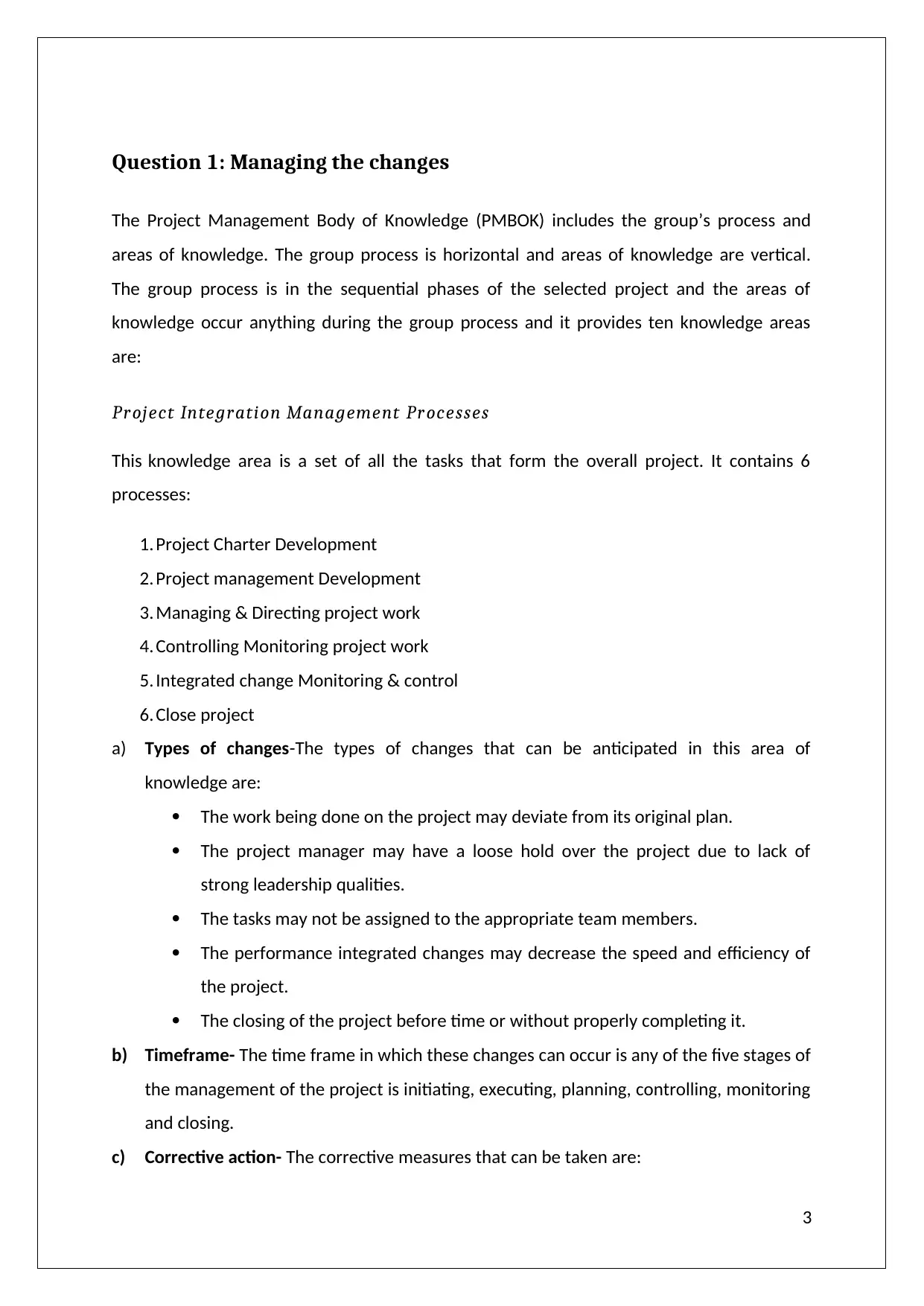
Question 1: Managing the changes
The Project Management Body of Knowledge (PMBOK) includes the group’s process and
areas of knowledge. The group process is horizontal and areas of knowledge are vertical.
The group process is in the sequential phases of the selected project and the areas of
knowledge occur anything during the group process and it provides ten knowledge areas
are:
Project Integration Management Processes
This knowledge area is a set of all the tasks that form the overall project. It contains 6
processes:
1. Project Charter Development
2. Project management Development
3. Managing & Directing project work
4. Controlling Monitoring project work
5. Integrated change Monitoring & control
6. Close project
a) Types of changes-The types of changes that can be anticipated in this area of
knowledge are:
The work being done on the project may deviate from its original plan.
The project manager may have a loose hold over the project due to lack of
strong leadership qualities.
The tasks may not be assigned to the appropriate team members.
The performance integrated changes may decrease the speed and efficiency of
the project.
The closing of the project before time or without properly completing it.
b) Timeframe- The time frame in which these changes can occur is any of the five stages of
the management of the project is initiating, executing, planning, controlling, monitoring
and closing.
c) Corrective action- The corrective measures that can be taken are:
3
The Project Management Body of Knowledge (PMBOK) includes the group’s process and
areas of knowledge. The group process is horizontal and areas of knowledge are vertical.
The group process is in the sequential phases of the selected project and the areas of
knowledge occur anything during the group process and it provides ten knowledge areas
are:
Project Integration Management Processes
This knowledge area is a set of all the tasks that form the overall project. It contains 6
processes:
1. Project Charter Development
2. Project management Development
3. Managing & Directing project work
4. Controlling Monitoring project work
5. Integrated change Monitoring & control
6. Close project
a) Types of changes-The types of changes that can be anticipated in this area of
knowledge are:
The work being done on the project may deviate from its original plan.
The project manager may have a loose hold over the project due to lack of
strong leadership qualities.
The tasks may not be assigned to the appropriate team members.
The performance integrated changes may decrease the speed and efficiency of
the project.
The closing of the project before time or without properly completing it.
b) Timeframe- The time frame in which these changes can occur is any of the five stages of
the management of the project is initiating, executing, planning, controlling, monitoring
and closing.
c) Corrective action- The corrective measures that can be taken are:
3
Paraphrase This Document
Need a fresh take? Get an instant paraphrase of this document with our AI Paraphraser
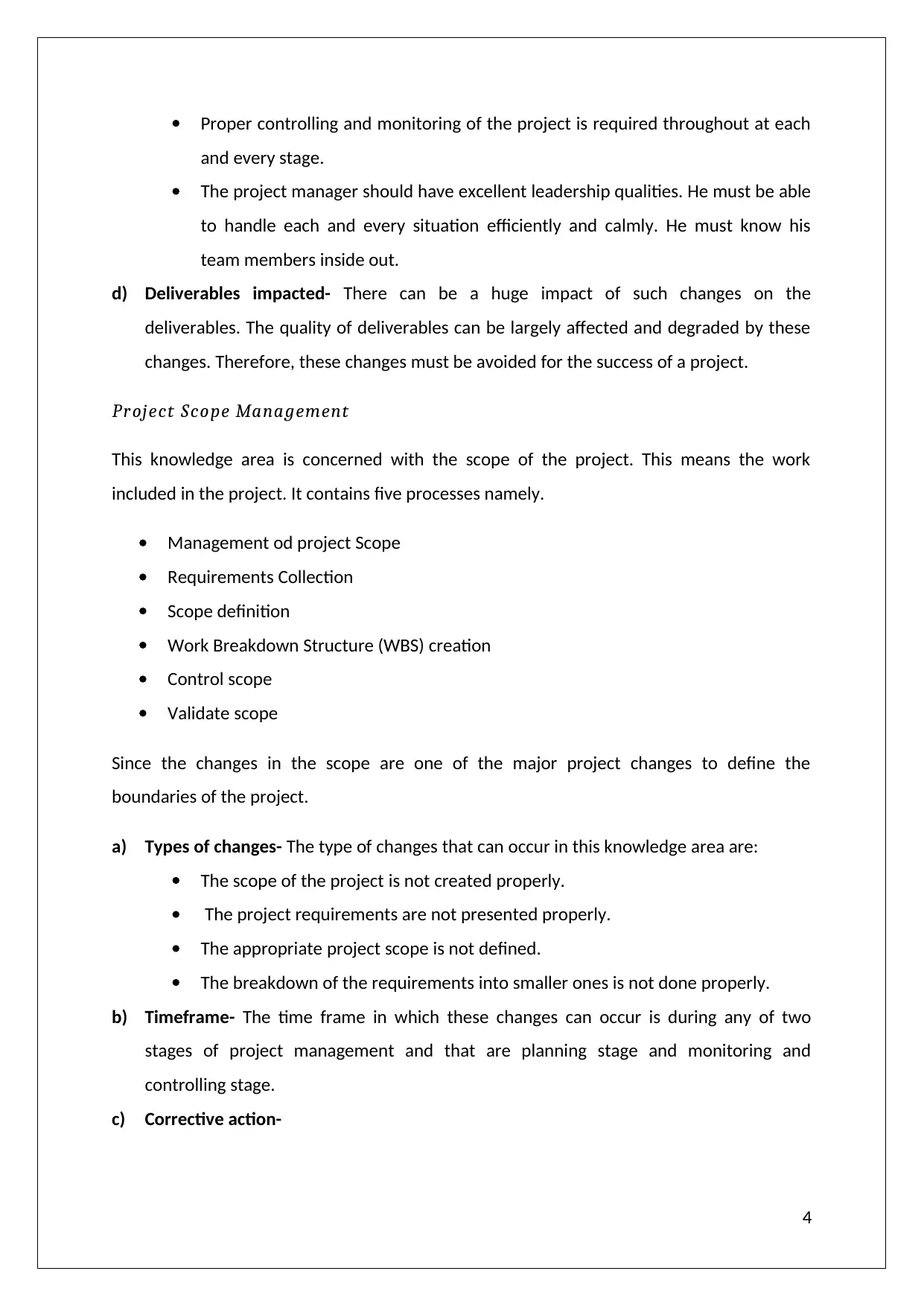
Proper controlling and monitoring of the project is required throughout at each
and every stage.
The project manager should have excellent leadership qualities. He must be able
to handle each and every situation efficiently and calmly. He must know his
team members inside out.
d) Deliverables impacted- There can be a huge impact of such changes on the
deliverables. The quality of deliverables can be largely affected and degraded by these
changes. Therefore, these changes must be avoided for the success of a project.
Project Scope Management
This knowledge area is concerned with the scope of the project. This means the work
included in the project. It contains five processes namely.
Management od project Scope
Requirements Collection
Scope definition
Work Breakdown Structure (WBS) creation
Control scope
Validate scope
Since the changes in the scope are one of the major project changes to define the
boundaries of the project.
a) Types of changes- The type of changes that can occur in this knowledge area are:
The scope of the project is not created properly.
The project requirements are not presented properly.
The appropriate project scope is not defined.
The breakdown of the requirements into smaller ones is not done properly.
b) Timeframe- The time frame in which these changes can occur is during any of two
stages of project management and that are planning stage and monitoring and
controlling stage.
c) Corrective action-
4
and every stage.
The project manager should have excellent leadership qualities. He must be able
to handle each and every situation efficiently and calmly. He must know his
team members inside out.
d) Deliverables impacted- There can be a huge impact of such changes on the
deliverables. The quality of deliverables can be largely affected and degraded by these
changes. Therefore, these changes must be avoided for the success of a project.
Project Scope Management
This knowledge area is concerned with the scope of the project. This means the work
included in the project. It contains five processes namely.
Management od project Scope
Requirements Collection
Scope definition
Work Breakdown Structure (WBS) creation
Control scope
Validate scope
Since the changes in the scope are one of the major project changes to define the
boundaries of the project.
a) Types of changes- The type of changes that can occur in this knowledge area are:
The scope of the project is not created properly.
The project requirements are not presented properly.
The appropriate project scope is not defined.
The breakdown of the requirements into smaller ones is not done properly.
b) Timeframe- The time frame in which these changes can occur is during any of two
stages of project management and that are planning stage and monitoring and
controlling stage.
c) Corrective action-
4
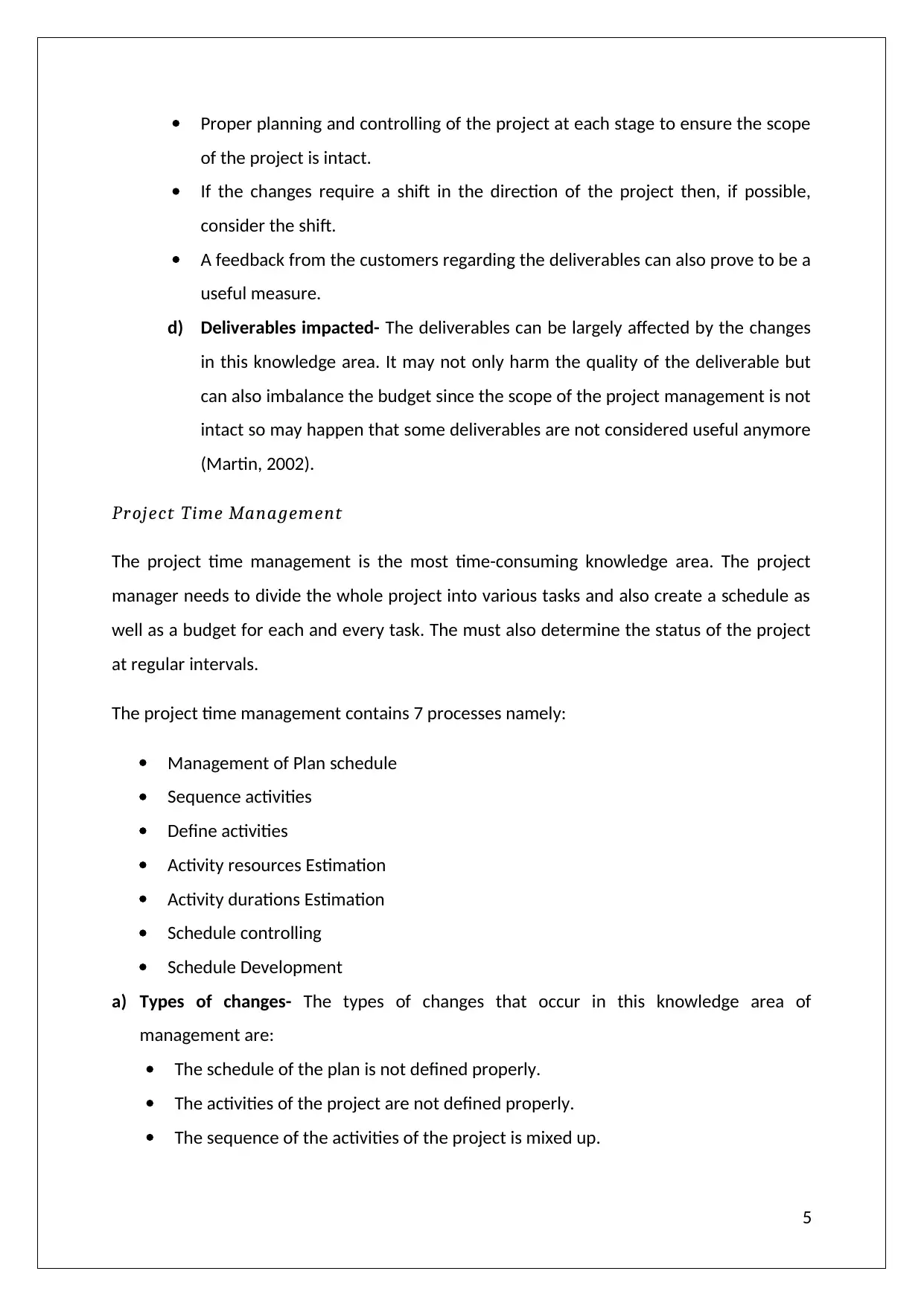
Proper planning and controlling of the project at each stage to ensure the scope
of the project is intact.
If the changes require a shift in the direction of the project then, if possible,
consider the shift.
A feedback from the customers regarding the deliverables can also prove to be a
useful measure.
d) Deliverables impacted- The deliverables can be largely affected by the changes
in this knowledge area. It may not only harm the quality of the deliverable but
can also imbalance the budget since the scope of the project management is not
intact so may happen that some deliverables are not considered useful anymore
(Martin, 2002).
Project Time Management
The project time management is the most time-consuming knowledge area. The project
manager needs to divide the whole project into various tasks and also create a schedule as
well as a budget for each and every task. The must also determine the status of the project
at regular intervals.
The project time management contains 7 processes namely:
Management of Plan schedule
Sequence activities
Define activities
Activity resources Estimation
Activity durations Estimation
Schedule controlling
Schedule Development
a) Types of changes- The types of changes that occur in this knowledge area of
management are:
The schedule of the plan is not defined properly.
The activities of the project are not defined properly.
The sequence of the activities of the project is mixed up.
5
of the project is intact.
If the changes require a shift in the direction of the project then, if possible,
consider the shift.
A feedback from the customers regarding the deliverables can also prove to be a
useful measure.
d) Deliverables impacted- The deliverables can be largely affected by the changes
in this knowledge area. It may not only harm the quality of the deliverable but
can also imbalance the budget since the scope of the project management is not
intact so may happen that some deliverables are not considered useful anymore
(Martin, 2002).
Project Time Management
The project time management is the most time-consuming knowledge area. The project
manager needs to divide the whole project into various tasks and also create a schedule as
well as a budget for each and every task. The must also determine the status of the project
at regular intervals.
The project time management contains 7 processes namely:
Management of Plan schedule
Sequence activities
Define activities
Activity resources Estimation
Activity durations Estimation
Schedule controlling
Schedule Development
a) Types of changes- The types of changes that occur in this knowledge area of
management are:
The schedule of the plan is not defined properly.
The activities of the project are not defined properly.
The sequence of the activities of the project is mixed up.
5
⊘ This is a preview!⊘
Do you want full access?
Subscribe today to unlock all pages.

Trusted by 1+ million students worldwide
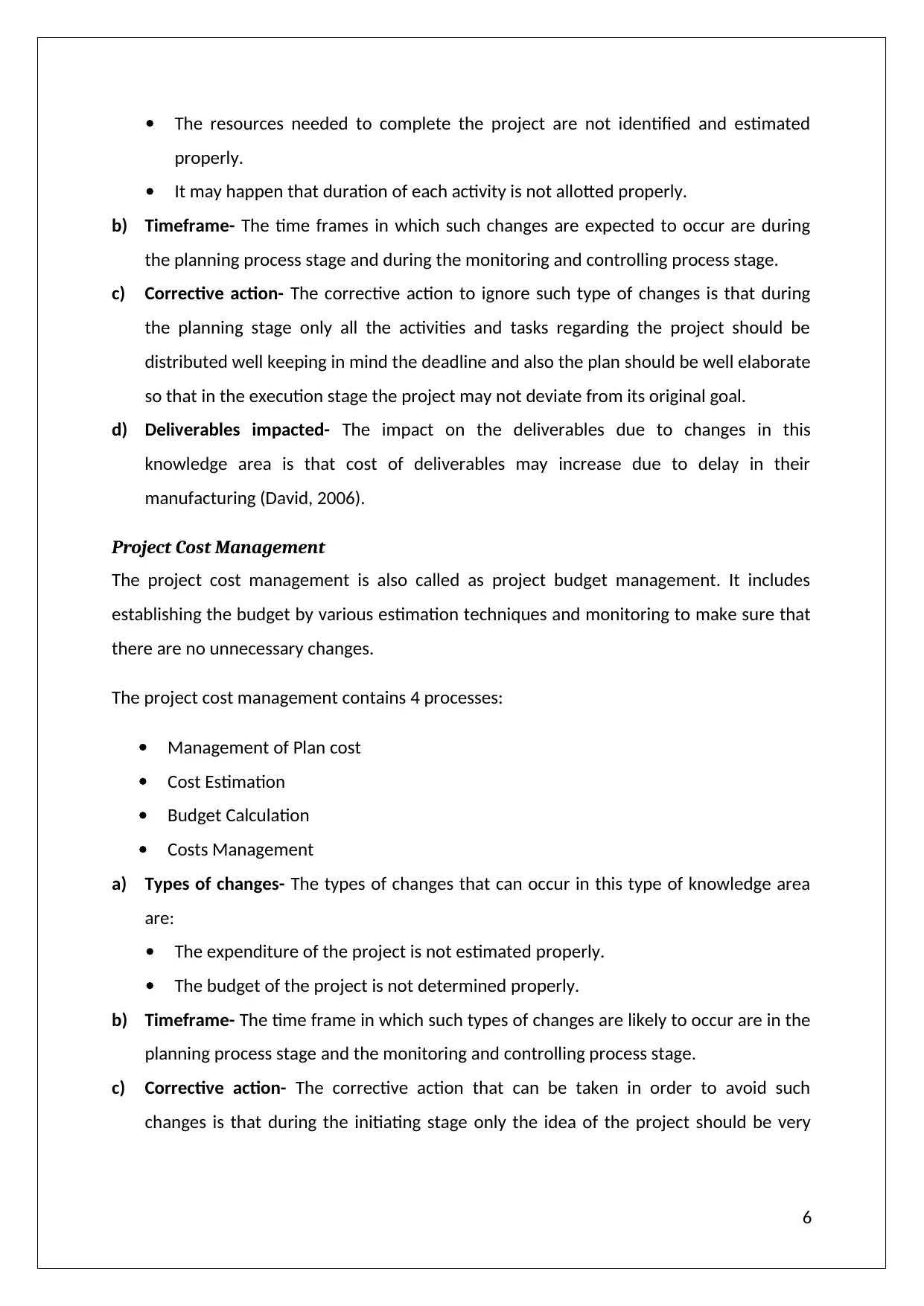
The resources needed to complete the project are not identified and estimated
properly.
It may happen that duration of each activity is not allotted properly.
b) Timeframe- The time frames in which such changes are expected to occur are during
the planning process stage and during the monitoring and controlling process stage.
c) Corrective action- The corrective action to ignore such type of changes is that during
the planning stage only all the activities and tasks regarding the project should be
distributed well keeping in mind the deadline and also the plan should be well elaborate
so that in the execution stage the project may not deviate from its original goal.
d) Deliverables impacted- The impact on the deliverables due to changes in this
knowledge area is that cost of deliverables may increase due to delay in their
manufacturing (David, 2006).
Project Cost Management
The project cost management is also called as project budget management. It includes
establishing the budget by various estimation techniques and monitoring to make sure that
there are no unnecessary changes.
The project cost management contains 4 processes:
Management of Plan cost
Cost Estimation
Budget Calculation
Costs Management
a) Types of changes- The types of changes that can occur in this type of knowledge area
are:
The expenditure of the project is not estimated properly.
The budget of the project is not determined properly.
b) Timeframe- The time frame in which such types of changes are likely to occur are in the
planning process stage and the monitoring and controlling process stage.
c) Corrective action- The corrective action that can be taken in order to avoid such
changes is that during the initiating stage only the idea of the project should be very
6
properly.
It may happen that duration of each activity is not allotted properly.
b) Timeframe- The time frames in which such changes are expected to occur are during
the planning process stage and during the monitoring and controlling process stage.
c) Corrective action- The corrective action to ignore such type of changes is that during
the planning stage only all the activities and tasks regarding the project should be
distributed well keeping in mind the deadline and also the plan should be well elaborate
so that in the execution stage the project may not deviate from its original goal.
d) Deliverables impacted- The impact on the deliverables due to changes in this
knowledge area is that cost of deliverables may increase due to delay in their
manufacturing (David, 2006).
Project Cost Management
The project cost management is also called as project budget management. It includes
establishing the budget by various estimation techniques and monitoring to make sure that
there are no unnecessary changes.
The project cost management contains 4 processes:
Management of Plan cost
Cost Estimation
Budget Calculation
Costs Management
a) Types of changes- The types of changes that can occur in this type of knowledge area
are:
The expenditure of the project is not estimated properly.
The budget of the project is not determined properly.
b) Timeframe- The time frame in which such types of changes are likely to occur are in the
planning process stage and the monitoring and controlling process stage.
c) Corrective action- The corrective action that can be taken in order to avoid such
changes is that during the initiating stage only the idea of the project should be very
6
Paraphrase This Document
Need a fresh take? Get an instant paraphrase of this document with our AI Paraphraser
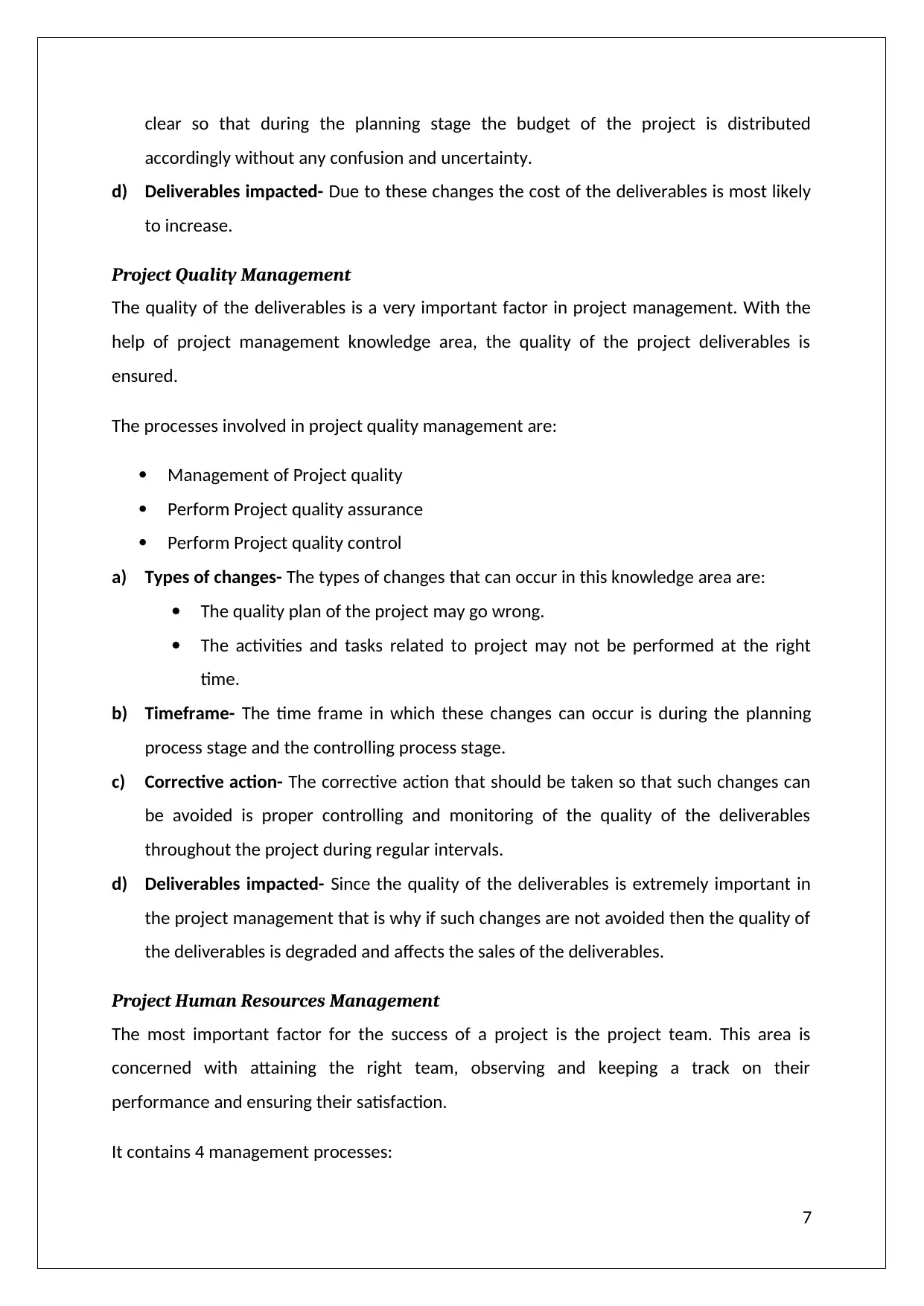
clear so that during the planning stage the budget of the project is distributed
accordingly without any confusion and uncertainty.
d) Deliverables impacted- Due to these changes the cost of the deliverables is most likely
to increase.
Project Quality Management
The quality of the deliverables is a very important factor in project management. With the
help of project management knowledge area, the quality of the project deliverables is
ensured.
The processes involved in project quality management are:
Management of Project quality
Perform Project quality assurance
Perform Project quality control
a) Types of changes- The types of changes that can occur in this knowledge area are:
The quality plan of the project may go wrong.
The activities and tasks related to project may not be performed at the right
time.
b) Timeframe- The time frame in which these changes can occur is during the planning
process stage and the controlling process stage.
c) Corrective action- The corrective action that should be taken so that such changes can
be avoided is proper controlling and monitoring of the quality of the deliverables
throughout the project during regular intervals.
d) Deliverables impacted- Since the quality of the deliverables is extremely important in
the project management that is why if such changes are not avoided then the quality of
the deliverables is degraded and affects the sales of the deliverables.
Project Human Resources Management
The most important factor for the success of a project is the project team. This area is
concerned with attaining the right team, observing and keeping a track on their
performance and ensuring their satisfaction.
It contains 4 management processes:
7
accordingly without any confusion and uncertainty.
d) Deliverables impacted- Due to these changes the cost of the deliverables is most likely
to increase.
Project Quality Management
The quality of the deliverables is a very important factor in project management. With the
help of project management knowledge area, the quality of the project deliverables is
ensured.
The processes involved in project quality management are:
Management of Project quality
Perform Project quality assurance
Perform Project quality control
a) Types of changes- The types of changes that can occur in this knowledge area are:
The quality plan of the project may go wrong.
The activities and tasks related to project may not be performed at the right
time.
b) Timeframe- The time frame in which these changes can occur is during the planning
process stage and the controlling process stage.
c) Corrective action- The corrective action that should be taken so that such changes can
be avoided is proper controlling and monitoring of the quality of the deliverables
throughout the project during regular intervals.
d) Deliverables impacted- Since the quality of the deliverables is extremely important in
the project management that is why if such changes are not avoided then the quality of
the deliverables is degraded and affects the sales of the deliverables.
Project Human Resources Management
The most important factor for the success of a project is the project team. This area is
concerned with attaining the right team, observing and keeping a track on their
performance and ensuring their satisfaction.
It contains 4 management processes:
7
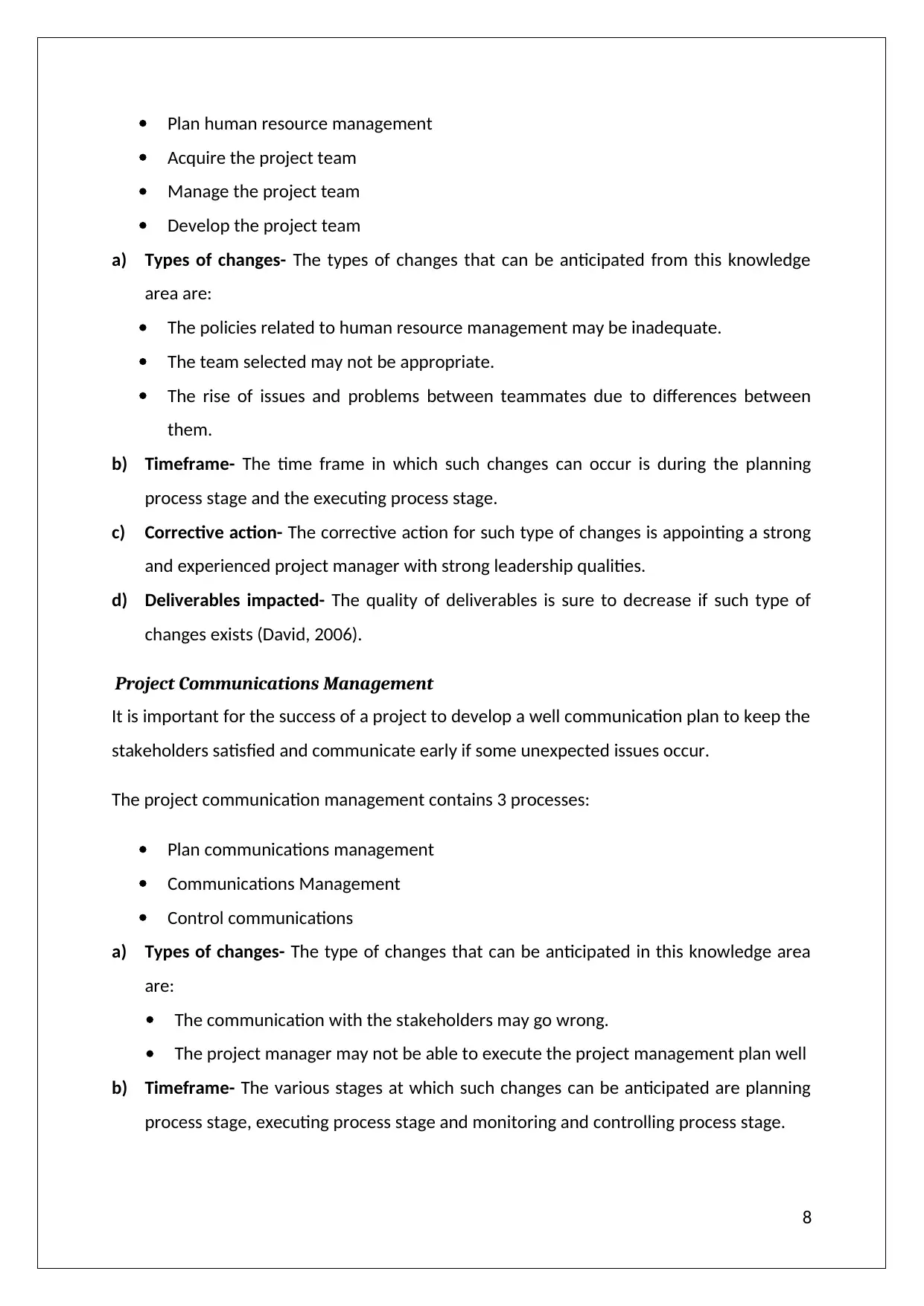
Plan human resource management
Acquire the project team
Manage the project team
Develop the project team
a) Types of changes- The types of changes that can be anticipated from this knowledge
area are:
The policies related to human resource management may be inadequate.
The team selected may not be appropriate.
The rise of issues and problems between teammates due to differences between
them.
b) Timeframe- The time frame in which such changes can occur is during the planning
process stage and the executing process stage.
c) Corrective action- The corrective action for such type of changes is appointing a strong
and experienced project manager with strong leadership qualities.
d) Deliverables impacted- The quality of deliverables is sure to decrease if such type of
changes exists (David, 2006).
Project Communications Management
It is important for the success of a project to develop a well communication plan to keep the
stakeholders satisfied and communicate early if some unexpected issues occur.
The project communication management contains 3 processes:
Plan communications management
Communications Management
Control communications
a) Types of changes- The type of changes that can be anticipated in this knowledge area
are:
The communication with the stakeholders may go wrong.
The project manager may not be able to execute the project management plan well
b) Timeframe- The various stages at which such changes can be anticipated are planning
process stage, executing process stage and monitoring and controlling process stage.
8
Acquire the project team
Manage the project team
Develop the project team
a) Types of changes- The types of changes that can be anticipated from this knowledge
area are:
The policies related to human resource management may be inadequate.
The team selected may not be appropriate.
The rise of issues and problems between teammates due to differences between
them.
b) Timeframe- The time frame in which such changes can occur is during the planning
process stage and the executing process stage.
c) Corrective action- The corrective action for such type of changes is appointing a strong
and experienced project manager with strong leadership qualities.
d) Deliverables impacted- The quality of deliverables is sure to decrease if such type of
changes exists (David, 2006).
Project Communications Management
It is important for the success of a project to develop a well communication plan to keep the
stakeholders satisfied and communicate early if some unexpected issues occur.
The project communication management contains 3 processes:
Plan communications management
Communications Management
Control communications
a) Types of changes- The type of changes that can be anticipated in this knowledge area
are:
The communication with the stakeholders may go wrong.
The project manager may not be able to execute the project management plan well
b) Timeframe- The various stages at which such changes can be anticipated are planning
process stage, executing process stage and monitoring and controlling process stage.
8
⊘ This is a preview!⊘
Do you want full access?
Subscribe today to unlock all pages.

Trusted by 1+ million students worldwide
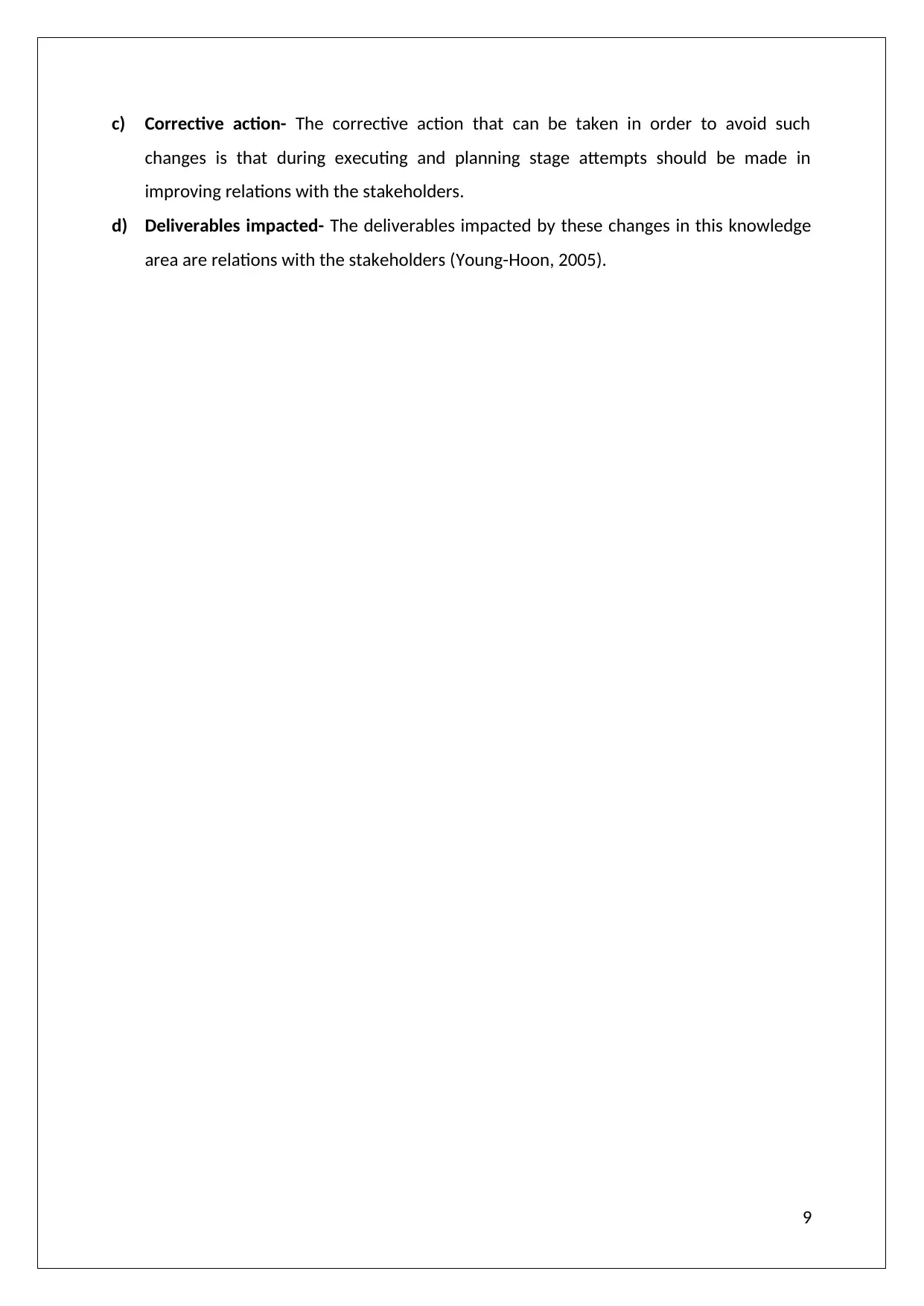
c) Corrective action- The corrective action that can be taken in order to avoid such
changes is that during executing and planning stage attempts should be made in
improving relations with the stakeholders.
d) Deliverables impacted- The deliverables impacted by these changes in this knowledge
area are relations with the stakeholders (Young-Hoon, 2005).
9
changes is that during executing and planning stage attempts should be made in
improving relations with the stakeholders.
d) Deliverables impacted- The deliverables impacted by these changes in this knowledge
area are relations with the stakeholders (Young-Hoon, 2005).
9
Paraphrase This Document
Need a fresh take? Get an instant paraphrase of this document with our AI Paraphraser
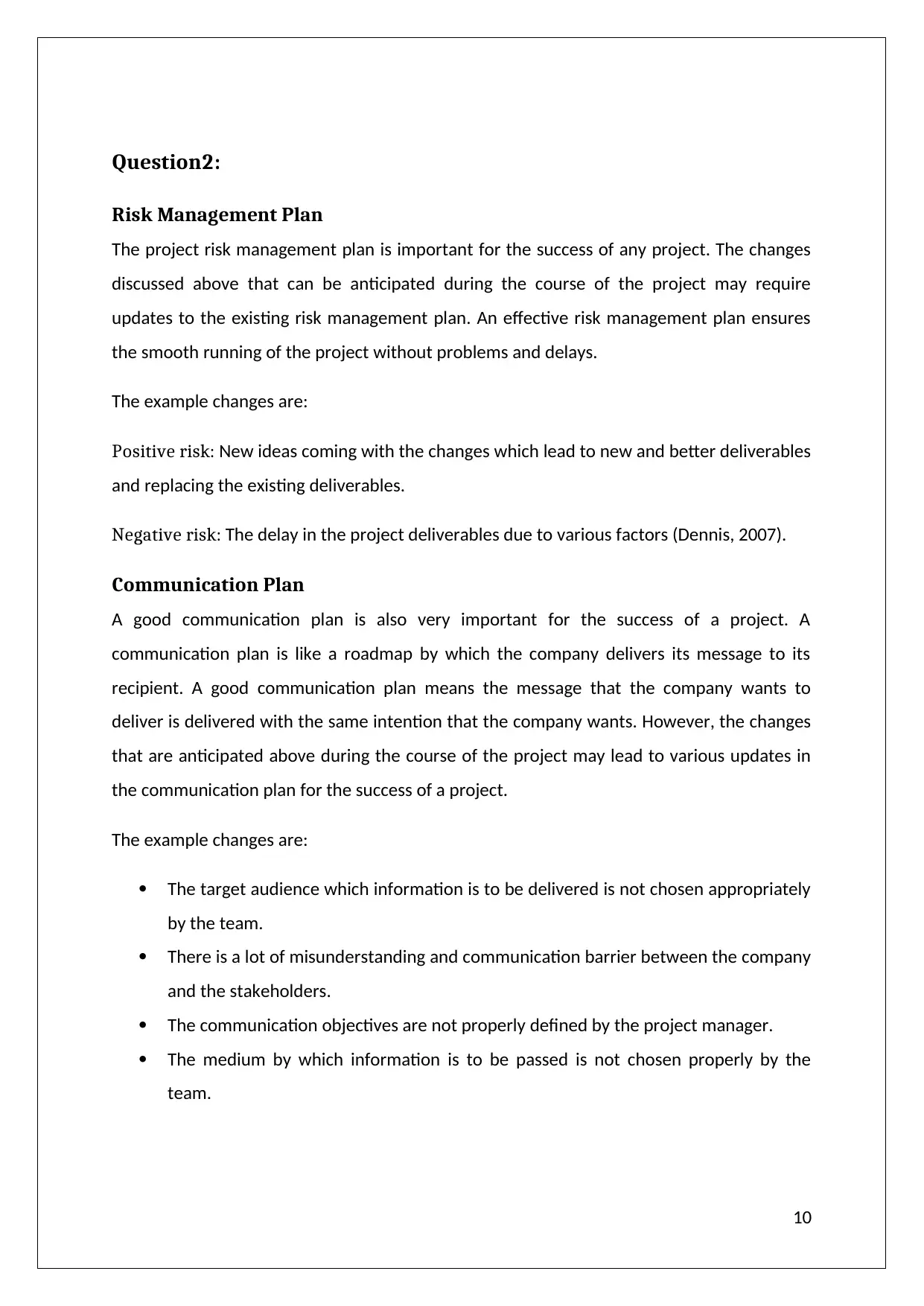
Question2:
Risk Management Plan
The project risk management plan is important for the success of any project. The changes
discussed above that can be anticipated during the course of the project may require
updates to the existing risk management plan. An effective risk management plan ensures
the smooth running of the project without problems and delays.
The example changes are:
Positive risk: New ideas coming with the changes which lead to new and better deliverables
and replacing the existing deliverables.
Negative risk: The delay in the project deliverables due to various factors (Dennis, 2007).
Communication Plan
A good communication plan is also very important for the success of a project. A
communication plan is like a roadmap by which the company delivers its message to its
recipient. A good communication plan means the message that the company wants to
deliver is delivered with the same intention that the company wants. However, the changes
that are anticipated above during the course of the project may lead to various updates in
the communication plan for the success of a project.
The example changes are:
The target audience which information is to be delivered is not chosen appropriately
by the team.
There is a lot of misunderstanding and communication barrier between the company
and the stakeholders.
The communication objectives are not properly defined by the project manager.
The medium by which information is to be passed is not chosen properly by the
team.
10
Risk Management Plan
The project risk management plan is important for the success of any project. The changes
discussed above that can be anticipated during the course of the project may require
updates to the existing risk management plan. An effective risk management plan ensures
the smooth running of the project without problems and delays.
The example changes are:
Positive risk: New ideas coming with the changes which lead to new and better deliverables
and replacing the existing deliverables.
Negative risk: The delay in the project deliverables due to various factors (Dennis, 2007).
Communication Plan
A good communication plan is also very important for the success of a project. A
communication plan is like a roadmap by which the company delivers its message to its
recipient. A good communication plan means the message that the company wants to
deliver is delivered with the same intention that the company wants. However, the changes
that are anticipated above during the course of the project may lead to various updates in
the communication plan for the success of a project.
The example changes are:
The target audience which information is to be delivered is not chosen appropriately
by the team.
There is a lot of misunderstanding and communication barrier between the company
and the stakeholders.
The communication objectives are not properly defined by the project manager.
The medium by which information is to be passed is not chosen properly by the
team.
10
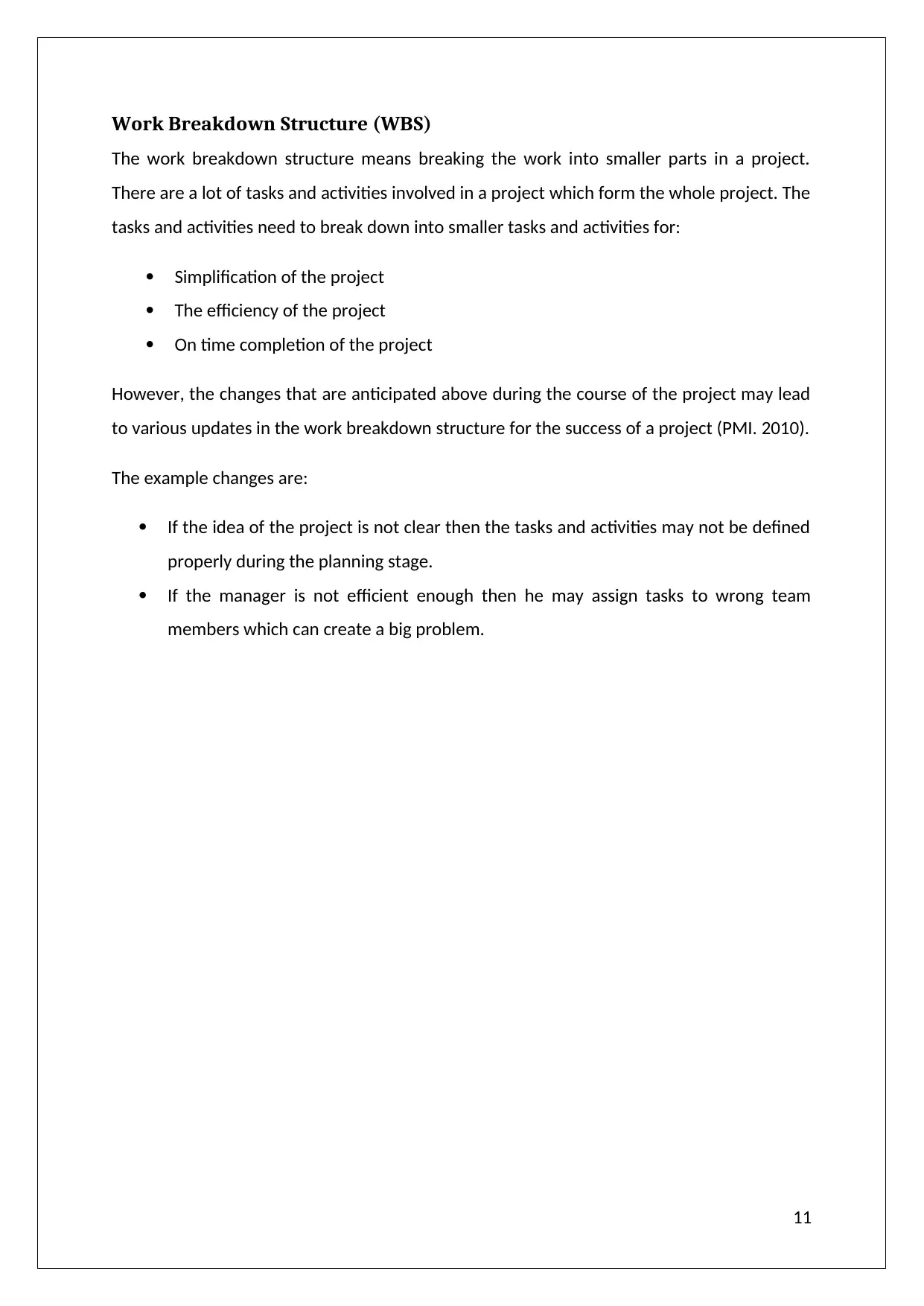
Work Breakdown Structure (WBS)
The work breakdown structure means breaking the work into smaller parts in a project.
There are a lot of tasks and activities involved in a project which form the whole project. The
tasks and activities need to break down into smaller tasks and activities for:
Simplification of the project
The efficiency of the project
On time completion of the project
However, the changes that are anticipated above during the course of the project may lead
to various updates in the work breakdown structure for the success of a project (PMI. 2010).
The example changes are:
If the idea of the project is not clear then the tasks and activities may not be defined
properly during the planning stage.
If the manager is not efficient enough then he may assign tasks to wrong team
members which can create a big problem.
11
The work breakdown structure means breaking the work into smaller parts in a project.
There are a lot of tasks and activities involved in a project which form the whole project. The
tasks and activities need to break down into smaller tasks and activities for:
Simplification of the project
The efficiency of the project
On time completion of the project
However, the changes that are anticipated above during the course of the project may lead
to various updates in the work breakdown structure for the success of a project (PMI. 2010).
The example changes are:
If the idea of the project is not clear then the tasks and activities may not be defined
properly during the planning stage.
If the manager is not efficient enough then he may assign tasks to wrong team
members which can create a big problem.
11
⊘ This is a preview!⊘
Do you want full access?
Subscribe today to unlock all pages.

Trusted by 1+ million students worldwide
1 out of 19
Related Documents
Your All-in-One AI-Powered Toolkit for Academic Success.
+13062052269
info@desklib.com
Available 24*7 on WhatsApp / Email
![[object Object]](/_next/static/media/star-bottom.7253800d.svg)
Unlock your academic potential
Copyright © 2020–2026 A2Z Services. All Rights Reserved. Developed and managed by ZUCOL.



